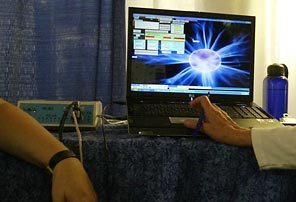Originally published Sunday, December 9, 2007 at 12:00 AM
FDA bans import of unproven machine
Trying to shut down a federal fugitive's medical-device empire, the U.S. Food and Drug Administration is blocking the import of the machine...
Seattle Times staff reporters
Trying to shut down a federal fugitive's medical-device empire, the U.S. Food and Drug Administration is blocking the import of the machine he claims can cure diseases such as cancer and AIDS.
The desktop device, called the EPFX, is manufactured in Hungary by William Nelson, who fled the U.S. in 1996 after he was indicted on felony fraud charges related to his invention.
FDA compliance director Timothy Ulatowski, who oversees medical-device regulation, said the action is the first step in a sweeping investigation of Nelson, his distributors and EPFX operators.
"This is pure, blatant fraud. The claims are baloney," Ulatowski said. "These people prey in many cases on consumers who are desperate in seeking cures for very serious diseases."
The FDA said it took action as a result of a recent Seattle Times investigation that uncovered a global network of manufacturers who sell unproven devices and practitioners who exploit unsuspecting patients.
Also in response, a congressional subcommittee is investigating how these manufacturers have taken advantage of federal loopholes to profit from the machines. And last week, the Washington State Chiropractic Association asked a state board that governs chiropractors to ban the EPFX.
The Times series revealed how manufacturers and operators used unproven devices — some illegal, some dangerous — to misdiagnose diseases, divert critically ill people from life-saving care, and drain their bank accounts.
Many operators dupe patients by posing as highly trained health-care professionals through the use of deceptive credentials and degrees from unaccredited institutions.
These victims are casualties in the growing field called "energy medicine" — alternative therapies based on the belief that the body has energy fields that can be manipulated to improve health.
Thousands of these unproven medical devices were found in venues across the country from health-care clinics in Florida to an 866-bed hospital in Missouri.
The FDA and state regulators failed to confiscate or warn the public about a dangerous device, the PAP-IMI, a 260-pound electromagnetic pulsing machine linked to patient injuries and death.
The devices, made in Greece by math professor Panos Pappas, were smuggled into the U.S. as seed germinators. They remain in use today in at least five states, including Washington.
![]()
The FDA will take action against the PAP-IMI, Ulatowski said, but he wouldn't give details.
"I don't want to tip my hand to those who might benefit," he said. "They may evade action."
Under indictment
The EPFX is one of the most prevalent energy devices in the U.S., with an estimated 10,000 machines in clinics, offices and homes. More have been sold in the Northwest than in any other region.
Nelson, a native of Ohio, registered his company, Eclosion, with the FDA in 1989 as a maker of biofeedback machines, meaning he could sell his invention but only as a stress-relieving tool.
In 1992, the FDA warned him to stop making fraudulent claims that his device could diagnose and heal. In 1996 he fled the U.S. after he was indicted on nine counts of felony fraud.
Despite his indictment, the FDA never revoked his registration. Nelson re-established himself in Budapest and began to sell the EPFX once again.
Today, the flamboyant Nelson, 56, rakes in millions of dollars monthly from the sales of devices, accessories and training materials.
Physicians, nurses and chiropractors across the country market and use the device, which now costs $19,900. One of the EPFX's celebrity pitchmen was Jeffrey Spencer, a chiropractor for champion cyclist Lance Armstrong.
Spencer said he used the device to treat some members of the U.S. cycling team during the 2003 and 2007 Tour de France, but never used it on Armstrong. When questioned for the Times series, he said he wouldn't use the machine again.
Ulatowski said Friday the FDA recently revoked Nelson's registration as a manufacturer, which will allow the agency to seize the machines at U.S borders. This first step will not affect those machines already in the country.
The FDA action is expected to cripple his sales network. Five of his six largest distributors are in the U.S. His largest distributor, The Quantum Alliance, is in Calgary, Alberta.
Ulatowski said federal officials are working with foreign regulators to see what actions can be taken.
"I'd like to invite Mr. Nelson back into the country. I'm sure we'd have a good welcome for him here," Ulatowski said.
Neither Nelson nor Quantum officials responded to requests for comment.
No warning
For years, the FDA did not warn the public about the dangers of the PAP-IMI nor address Nelson's outrageous claims and the rapid spread of the EPFX.
Ulatowski said the FDA thought it had tackled those problems when it helped to bring the fraud charges against Nelson and shut down a Los Angeles PAP-IMI clinic.
"These products in general are like weeds," Ulatowski said. "You stamp them out and you take action and they well may pop up again. Here we are again. We have to address it, and the agency will."
The Times found that unscrupulous device makers and operators took advantage of federal regulations that let them operate on an honor system in clinical studies.
The FDA routinely cedes its oversight of such studies to committees of medical professionals called institutional review boards, or IRBs. Review boards are required to oversee the design and safety of clinical studies.
Scores of private companies sell IRB services, which offer the promise of quick study approval and oversight for as little as a few thousand dollars.
The medical devices involved in clinical studies will be included in the investigation being conducted by a U.S. House Energy and Commerce subcommittee, which oversees the FDA.
Rep. Jay Inslee, D-Bainbridge Island, requested the expanded investigation. He wants to eliminate "IRB shopping," in which a device maker can hire a private overseer for a study. The FDA does not track most of the studies.
Rep. Bart Stupak, subcommittee chairman, and Rep. John Dingell, chairman of the full committee and a subcommittee member, said in a statement that FDA regulations may not adequately protect the public. Both are Michigan Democrats.
"We share your concern that Americans are being duped by dangerous, unproven devices that illegally claim to diagnose, treat and even cure their illnesses," they wrote to Inslee.
Christine Willmsen: 206-464-3261 or cwillmsen@seattletimes.com; Michael J. Berens: 206-464-2288 or mberens@seattletimes.com
Copyright © 2007 The Seattle Times Company
On the left hand, answers aren't easy
Getting active outside can bring sunshine to your winter
How to encourage healthy computing
Obese people asked to eat fast food for health study
Charlie Sheen claims AA has a 5 percent success rate — is he right?

general classifieds
Garage & estate salesFurniture & home furnishings
Electronics
just listed
More listings
POST A FREE LISTING




